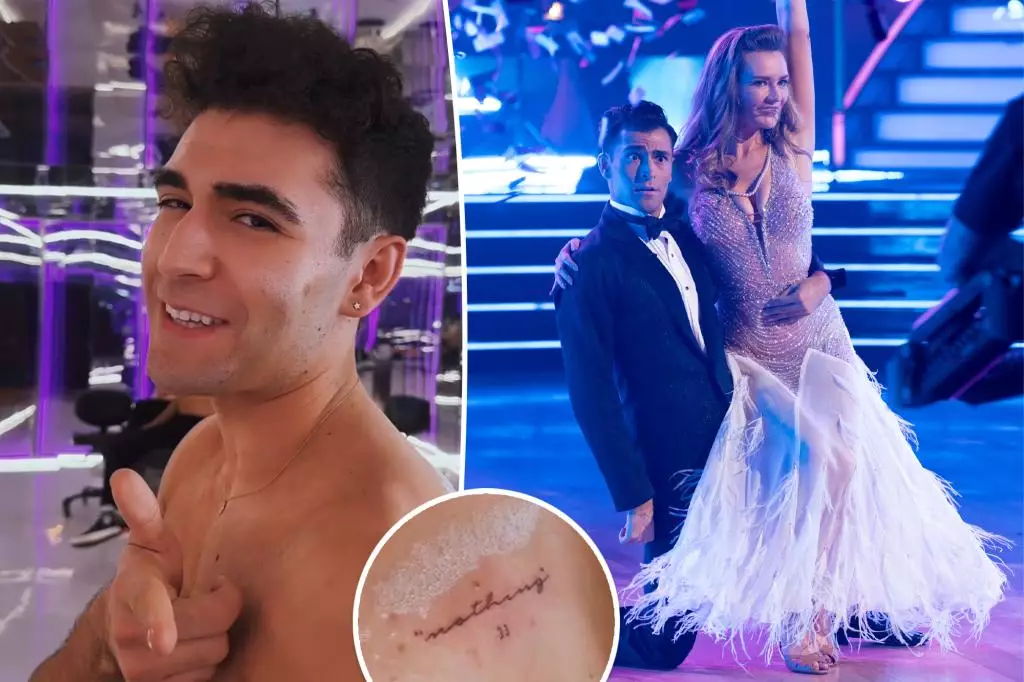The world of reality television often yields unexpected moments that become embedded in pop culture, and one of the most notable recent examples comes from the show “Dancing With the Stars.” In a surprising twist, pro dancer Ezra Sosa decided to immortalize Anna Delvey’s infamous one-word response following their elimination by getting a tattoo. The ink reads “nothing” in cursive across his back, accompanied by the number “33,” honoring the show’s 33rd season. This move encapsulates the peculiar blend of bravado and whimsy that often characterizes reality show participants, while also reflecting the absurdity of celebrity culture where fleeting moments are frozen in time.
Sosa’s decision is striking not just for its personal significance, but for how it transforms a moment of disappointment into an artistic expression. Although an immediate reaction may include amusement at the impulsive nature of the gesture, one cannot help but ponder the deeper implications of such a permanent reminder of a temporary experience. Captured in a TikTok video shared by Sosa, the tattoo reveal draws various reactions, from fans labeling it “iconic” to others idolizing Sosa as a newfound icon himself. This highlights the tumultuous landscape of social media interaction, where moments of vulnerability can quickly become viral content.
Delvey, the convicted con artist who previously captivated the public’s imagination as a supposed heiress, reacted with her trademark bluntness. Her comment “Exactly,” following Sosa’s tattoo reveal, mirrors her larger-than-life persona, feeding into the ongoing narrative surrounding her figure. This response sparked a myriad of interpretations; some lauded her authenticity, while others reinforced the criticism of her entirely dismissive attitude toward the opportunities provided by “Dancing With the Stars.” Her failure to acknowledge her experience can be read as a refusal to engage with the reality of her circumstances outside her crafted narrative.
Interestingly, the conversation surrounding Delvey’s flippancy did not end with her tacit approval of Sosa’s ink. Judge Carrie Ann Inaba expressed her dismay, characterizing Delvey’s remark as not just dismissive, but as a slight against all those involved in the production. This clash illustrates a stark contrast between the participants’ experiences and the audience’s expectations. Inaba’s insistence on the hard work of the cast and crew underscores a broader conversation about accountability and respect in competitive settings, particularly when the stakes feel personal to everyone involved.
In a follow-up to the post-elimination discussions, Delvey leveled accusations against the show, claiming that it exploited her for ratings rather than offering genuine support for her artistic growth. This perspective underscores a sense of betrayal—despite being offered a platform, she feels it was merely a stage for entertainment rather than a space for personal improvement. Her take echoes broader conversations about the ethics of reality television, where individuals are often seen as commodities for the sake of entertainment rather than as humans with valid experiences.
The tattoo saga encapsulates a complex web of relationships, perceptions, and the sometimes-vacuum of reality television. While Ezra Sosa’s dedication signifies a commitment to the moments and partnerships forged through the show, Anna Delvey’s reactions shed light on a more critical view of that same world. In an age where everything is recorded, edited, and shared, the dialogue surrounding reality television continues to evolve, pushing the boundaries of what it means to engage with an audience beyond mere spectacle.


Leave a Reply